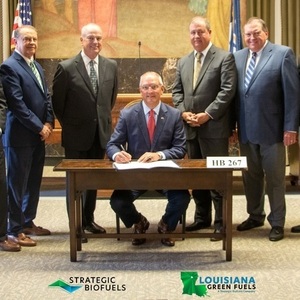Louisiana passes law benefiting Strategic Biofuels project

SOURCE: Business Wire
July 27, 2022
BY Strategic Biofuels LLC
Strategic Biofuels, the leader in developing negative carbon footprint renewable fuels plants, announced today that the State of Louisiana recently enhanced its nation-leading carbon capture and sequestration (CCS) legislation with provisions that provide additional carbon dioxide (CO2) reservoir storage security for projects in Caldwell Parish, the site of Strategic Biofuels’ Louisiana Green Fuels project.
The Parish-specific legislation, which goes into effect on August 1, 2022, extends the eminent domain acquisition of the pore rights for underground CO2 storage with a prohibition of third-party drilling through the storage reservoir. This drilling ban substantially reduces the risk of stored CO2 leakage. This legislation was passed unanimously by both houses of Louisiana’s State Legislature and signed into law by Governor John Bel Edwards as Act 163 on May 26, 2022. It received support from both the Louisiana Oil & Gas Association and the Louisiana Mid-Continent Oil & Gas Association.
The drilling ban in the law aligns the Caldwell Parish project with the carbon sequestration requirements of the California Air Resources Board’s Low Carbon Fuel Standard and facilitates qualification for credits for fuel delivered to that state. These credits, together with the credits under the federal Renewable Fuel Standard and the federal sequestration tax credits are significant contributors to the project’s revenues.
Advertisement
Advertisement
“This legislation is a major win for Strategic Biofuels and is another way that we worked together with the State and our governor to achieve numerous milestones that help ensure the LGF project succeeds,” said Paul Schubert, CEO of Strategic Biofuels. “Our working relationship with the State is a solid example of industry commitment and public policy paving the way for the unprecedented innovation of the LGF project.”
The project will produce clean renewable diesel fuel using waste wood from managed, sustainable forestry as well as all its own green power. Because both the carbon converted into fuel and the carbon permanently sequestered were first directly captured from the atmosphere by trees, the project will produce the lowest carbon footprint liquid fuel in the world.
Strategic Biofuels and the State have worked to achieve numerous milestones that will ensure that the Louisiana Green Fuels project succeeds. In February, the Governor allocated $250M of private activity bonds to the LGF project in addition to the $200M allocated the previous year. In January, the Port of Columbia was awarded a $15M grant for infrastructure improvements to help support Strategic Biofuels. This working relationship reflects the State’s focus on reaching net carbon zero by 2050 and is a solid example of industry commitment and public policy paving the way for the unprecedented innovation of the Louisiana Green Fuels project.
“I’m proud to have signed this bill into law,” said Gov. John Bel Edwards. “It advances our State’s climate initiative while bringing new opportunities for the traditional oil and gas industry and its workers. The Caldwell Parish project will bring significant economic benefits to the entire Northeastern Louisiana region.”
Advertisement
Advertisement
The law was originally introduced as HB267 to the State House by District 20 Representative, Neil Riser, and in the State Senate by Sen. Glen Womack and was signed into law as Act 163.
For more information about Strategic Biofuels or the Louisiana Green Fuels project, visit: www.strategicbiofuels.com.
Related Stories
Calumet Inc. on Aug. 8 confirmed its Montana Renewables biorefinery is currently running at full capacity. An initial phase of the company’s MaxSAF initiative remains on track to boost SAF capacity to up to 150 MMgy by mid-2026.
Marathon Petroleum Corp. on Aug. 5 released second quarter financial results, reporting improved EBITDA for its renewable diesel segment. The company primarily attributed the improvement to increased utilization and higher margins.
Chevron Corp. on Aug. 1 confirmed the company started production at the Geismar renewable diesel plant in Louisiana during the second quarter after completing work to expand plant capacity from 7,000 to 22,000 barrels per day.
California’s new specified source feedstock attestation requirement: A critical new compliance step for renewable fuel producers
As of July 2025, California’s SCFS requires renewable fuel producers using specified source feedstocks to secure attestation letters reaching back to the point of origin. This marks a significant shift in compliance expectations.
The public comment period on the U.S. EPA’s proposed rule to set 2026 and 2027 RFS RVOs and revise RFS regulations closed Aug. 8. Biofuel groups have largely expressed support for the proposal but also outlined several ways to improve the rulemaking.
Upcoming Events










